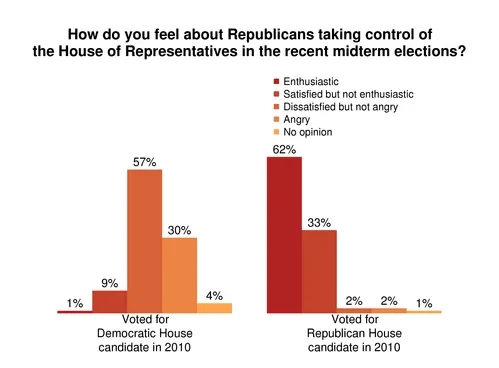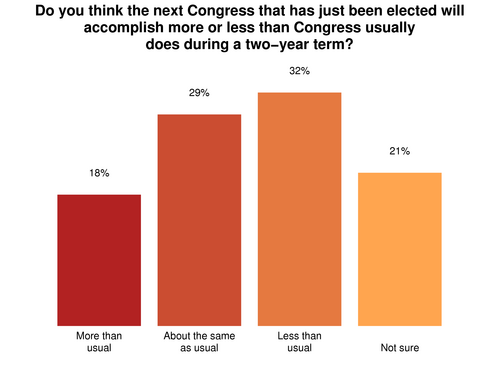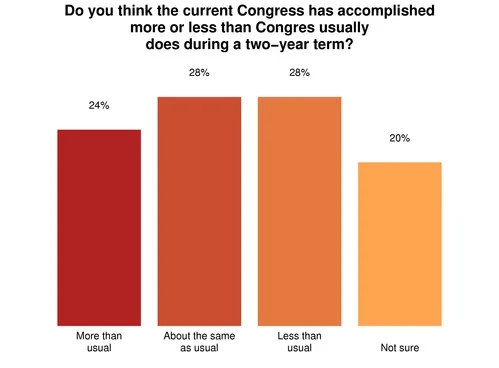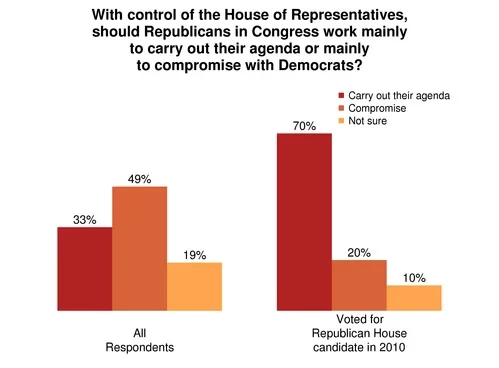Overall, Americans are split over the outcome: 46% are enthusiastic or satisfied, 39% are dissatisfied or angry.

While Republicans may be excited about the outcome, many Americans don’t expect much from the new Congress. In fact, more say the new Congress will accomplish LESS than usual than say this about the current legislature. 28% say the current Congress accomplished less than Congresses usually do; 32% expect the NEXT Congress to produce less. Only 18% think the new Congress will get more done than usual.


Even Republican voters are mixed about what is likely to happen. 40% of them think the new Congress will accomplish more than usual, but 46% say it will accomplish about what Congresses usually do or even less than that.
The Americans people continue to express negative feelings about BOTH political parties and their leadership. 51% of Americans have unfavorable views of the Democratic Party; 52% are negative about the Republican Party. 54% have little or no confidence in the leaders of the Democrats in Congress, 47% have little or no confidence in the Republican leadership. Six in ten express little confidence in the leaders of Congress overall, and that may be no surprise for an institution with only a 11% approval rating.
How much confidence do you have in the leaders of...
| A great deal or quite a bit | Only some | Very little or non at all | No opinion | |
|---|---|---|---|---|
Congress | 6% | 24% | 61% | 8% |
The Democrats in Congress | 18% | 20% | 54% | 9% |
The Republicans in Congress | 21% | 22% | 47% | 9% |
Fewer than half of each party’s voters express a great deal or quite a bit of confidence in their own party’s leaders.
One of the criticisms of both parties is that they spend too much time opposing the other party than in providing constructive policy options. And the situation may not change. Although nationally, Americans would prefer that the new Republican leaders in Congress compromise, Republican voters overwhelmingly want their Congressional leaders to carry out their own agenda.

Meanwhile, Democrats, who lost their House majority last week, have become increasing interested in compromise. Two weeks ago, 68% of Democrats wanted their Congressman to compromise in order to achieve something. Now, 78% do. Republicans, then and now, wanted their Congressman to stick to principles, at any cost.
The agenda those who voted for the Republicans want includes repeal of health care. Asked what Congress should do first, 31% of Republican voters want to repeal health care reform. Cutting spending comes second, stimulating the economy third. For Democrats, the overwhelming agenda item is to create new jobs.
Asked directly about repeal of health care reform, Americans are divided. 42% favor it, 39% oppose it. Republicans – as well as those who support the Tea Party – overwhelmingly want repeal. Tea Party supporters rank it as their number one priority for Congress, followed (like Republican voters) by cutting government spending. Extending the Bush tax cuts is rated as a higher priority than stimulating the economy to create jobs.
Which of the following should be the highest priority for Congress to focus on
| All Respondents | Voted for Democratic House Candidate in 2010 | Voted for Republican House Candidate in 2010 | |
|---|---|---|---|
Extend income tax cuts enacted during the Bush administration | 7% | 2% | 14% |
Repeal the health care reform law | 13% | 2% | 31% |
Stimulate the economy to create new jobs | 41% | 67% | 18% |
Cut government spending | 16% | 10% | 23% |
Fight illegal immigration | 4% | 3% | 6% |
Improve public school quality | 5% | 8% | 0% |
Other | 6% | 6% | 5% |
Not sure | 8% | 1% | 2% |
The enthusiasm gap between Republicans and Democrats seen during the election continues afterwards, as Republicans are far more excited about the outcome than Democrats are angry, according to the latest Economist/YouGov Poll.
Six in ten Republican voters are enthusiastic about the outcome. While most Democratic voters are dissatisfied with the outcome, just 30% of them are actually angry.






